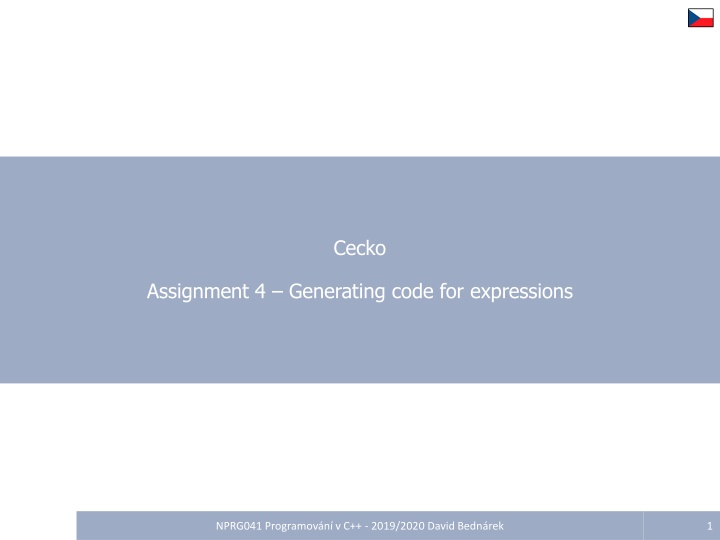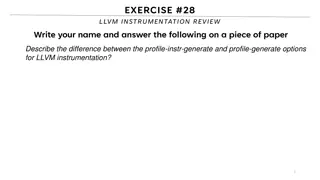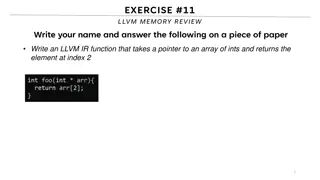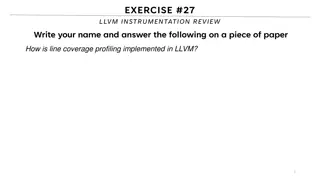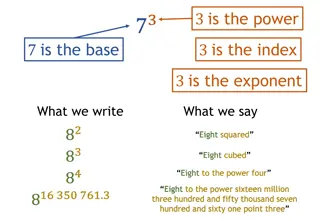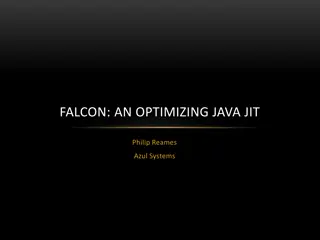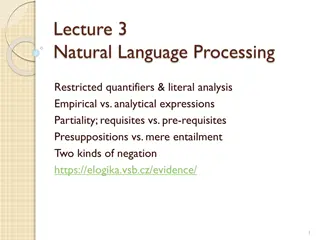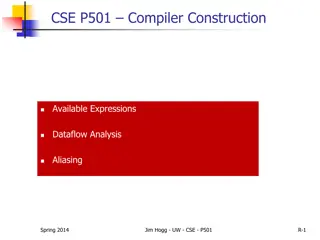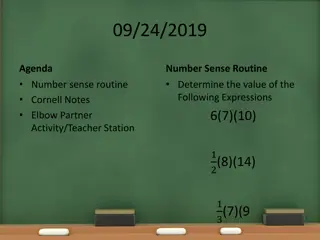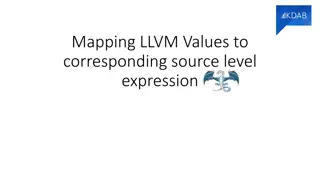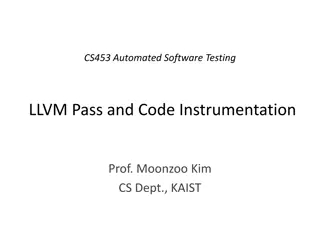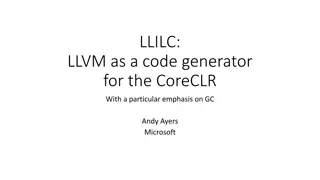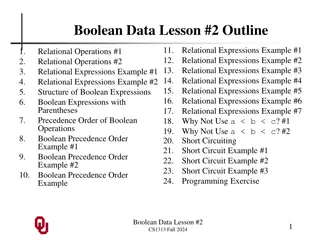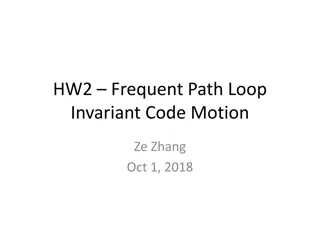Generating Code for Expressions in LLVM IR
LLVM IR, or Intermediate Representation, is a crucial aspect of code generation in LLVM. This form of code represents computations in a static-single-assignment manner, enhancing efficiency and enabling optimizations. Variables are symbolically represented, pointing to instructions rather than direct values. Understanding LLVM IR is essential for developing efficient compilers and code generators in C++.
Download Presentation

Please find below an Image/Link to download the presentation.
The content on the website is provided AS IS for your information and personal use only. It may not be sold, licensed, or shared on other websites without obtaining consent from the author.If you encounter any issues during the download, it is possible that the publisher has removed the file from their server.
You are allowed to download the files provided on this website for personal or commercial use, subject to the condition that they are used lawfully. All files are the property of their respective owners.
The content on the website is provided AS IS for your information and personal use only. It may not be sold, licensed, or shared on other websites without obtaining consent from the author.
E N D
Presentation Transcript
Cecko Assignment 4 Generating code for expressions NPRG041 Programov n v C++ - 2019/2020 David Bedn rek 1
A more detailed introduction to LLVM IR
LLVM IR llvm::Value Abstract class representing any "algorithm" providing a value Held by llvm::Value * = cecko::CKIRValueObs llvm::Constant llvm::ConstantInt integer constants computed during compilation other immutable values like addresses of global variables, functions or basic blocks Accessible by var_desc->get_ir() or function_desc->get_function_ir() llvm::Argument an argument of a function your code will never access the argument directly through llvm::Argument llvm::Instruction anything computed at run-time including llvm::AllocaInst - allocate an address for a local variable Automatically generated by the cecko framework Instructions are created using llvm::IRBuilder accessible as ctx->builder()->CreateXYZ(...) the builder appends instructions at an insertion point into a basic block it may also be in unbound state, unable to emit instructions preset by the framework upon entering a function body (ctx->enter_function()) within assignment 4, we will not create other basic blocks it is your responsibility to emit the final return instruction ctx->builder()->CreateRet(value) or CreateRetVoid() after explicit return, call ctx->builder()->ClearInsertionPoint() at the end of the function body, test ctx->builder()->GetInsertBlock() if not null, emit the implicit final return
LLVM IR LLVM IR is a Static-Single-Assignment (SSA) form of intermediate code Each "variable" is assigned only once This allows to use pointers to instructions instead of variables There are no true variables in the IR In the text dump, "variable" names are just symbolic names for the defining instructions Cecko variables are represented by IR "Values" containing addresses For global variables, it is a (load-time) Constant For local variables, it is the output of an Alloca instruction Allocas are inserted by the framework at the beginning of the function (not at the place of declaration) For a function argument, the framework also generates a Store instruction to initialize it local_var_desc->get_ir() is a pointer to the associated Alloca instruction int a,b,c; a=b+c; translates to ; --- generated by the framework: %a = alloca i32 %b = alloca i32 %c = alloca i32 ; --- the following is your responsibility: %t0 = load i32, i32* %b %t1 = load i32, i32* %c %t2 = add i32 %t0, %t1 store i32 %t2, i32* %c
LLVM IR int a,b,c; a=b+c; This IR... %t0 = load i32, i32* %b %t1 = load i32, i32* %c %t2 = add i32 %t0, %t1 store i32 %t2, i32* %c ... is generated by the following framework and LLVM calls: First, find what the identifiers mean: CKNamedObs a_desc = ctx->find("a"); CKNamedObs b_desc = ctx->find("b"); CKNamedObs c_desc = ctx->find("c"); you have to determine the kind of these objects (non-variables are handled differently) you have to check type compatibility within the operators if all three are variables of type int, you will call: CKIRTypeObs int_ir_type = ctx->get_int_type()->get_ir(); CKIRValueObs t0 = ctx->builder()->CreateLoad(int_ir_type,b_desc->get_ir(),"t"); CKIRValueObs t1 = ctx->builder()->CreateLoad(int_ir_type,c_desc->get_ir(),"t"); CKIRValueObs t2 = ctx->builder()->CreateAdd(t0,t1,"t"); ctx->builder()->CreateStore(t2,a_desc->get_ir()); LLVM automatically appends sequential numbers to the names of the instructions ("t") LLVM automatically determines the result type from the value arguments except of Load, ZExt, Trunc, and few other instructions it never performs implicit conversions In reality, this code must be separated into several semantic rules a, b, c, +, = You need a grammar attribute to represent a sub-expression
LLVM IR You need a grammar attribute (a C++ type) to represent a sub-expression This is the most complex problem in single-pass compilers If you find an identifier in an expression... CKNamedSafeObs desc = ctx->find(idf); if (! desc) message(errors::UNDEF_IDF, loc, idf); if you use SafeObs, you may call methods even if it is null if (desc->is_var()) ... if it is a variable, you don't know whether it will be read/written/... variable is an L-value and it must be represented by its address e.mode=Lvalue; e.address=desc->get_ir(); otherwise (enum constant or function), it does not have an address, only a value e.mode=Rvalue; e.value=desc->get_ir(); in any case, you will also need the type and the const flag e.type=desc->get_type(); e.is_const=desc->is_const(); There are also integer, character and string literals You need at least two modes of expressions Lvalue mode contains a CKIRValueObs representing the address of the expression Rvalue mode contains a CKIRValueObs representing the value of the expression This includes the case of constant expression use CKTryGetConstantInt to check it You will need a third mode to handle &&,||
LLVM IR Reading of variables is done only after there is an operation on them If you encounter an operator like e1+e2... Perform some implicit conversions array to pointer this changes an Lvalue array into an Rvalue pointer (no IR instruction) Check if the operation exists for the combination of types Convert operands to Rvalue mode by emitting a Load instruction Perform other implicit conversions _Bool/char to int emit ZExt instruction Emit the instruction for the operator Beware of pointer arithmetics The result will be an Rvalue Operator = emits the Store instruction After checking compatibility and performing conversions int to char Trunc instruction int/char to _Bool ICmpNE instruction with ctx->get_int32/8_constant(0) poiner to _Bool IsNotNull instruction There are also Lvalue-producing operators (e1[e2],*e1,e1.x,e1->x) *e1 produces no instruction if e1 is Rvalue &e1 never produces any instruction
Instructions needed for Cecko Instruction Asgn 4 Asgn 5 Note GlobalString STRLIT produces llvm::Constant* ConstInBoundsGEP2_32 Array to ptr use two 0 indexes ICmpNE char/int to _Bool != in _Bool= and conditions IsNotNull ptr to _Bool in _Bool= and conditions ZExt _Bool/char to char/int in most operators Trunc int to char in char= Add,Sub,Mul,SDiv,SRem int+int,-,*,/,% GEP ptr+int,ptr-int,ptr[int] Neg -int,ptr-int PtrDiff ptr-ptr StructGEP str.name,ptr->name use get_idx() ExtractValue f().name non-L-value before .name Load L-value to R-value Store = Ret,RetVoid return incl. implicit Call Function call incl. void
Instructions needed for Cecko Instruction Asgn 4 Asgn 5 Note ICmpEQ == ICmpSLT,SLE,SGT,SGE int<int,<=,>,>= ICmpULT,ULE,UGT,UGE ptr<ptr,<=,>,>= Not ! CondBr if,while,for,&&,|| Br else,while,for
